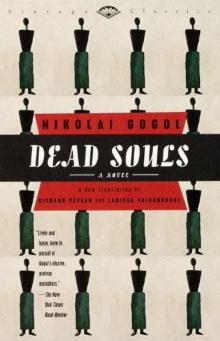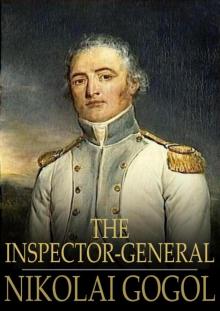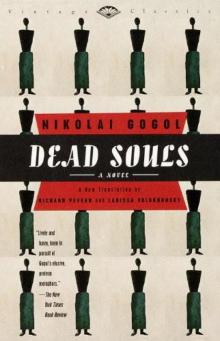- Home
- Nikolai Gogol
The Inspector-General Page 3
The Inspector-General Read online
Page 3
DOBCHINSKY. No, Piotr Ivanovich, I said "HEY!"
BOBCHINSKY. Well first YOU said it, then I did. "Hey!" said both of us, "And why does he stick here if he's going to Saratov?"—Yes, sir, that's he, the official.
GOVERNOR. Who? What official?
BOBCHINSKY. Why, the official who you were notified was coming, the Inspector.
GOVERNOR (terrified). Great God! What's that you're saying. It can't be he.
DOBCHINSKY. It is, though. Why, he doesn't pay his bills and he doesn't leave. Who else can it be? And his postchaise is ordered for Saratov.
BOBCHINSKY. It's he, it's he, it's he—why, he's so alert, he scrutinized everything. He saw that Dobchinsky and I were eating salmon—chiefly on account of Dobchinsky's stomach—and he looked at our plates so hard that I was frightened to death.
GOVERNOR. The Lord have mercy on us sinners! In what room is he staying?
DOBCHINSKY. Room number 5 near the stairway.
BOBCHINSKY. In the same room that the officers quarreled in when they passed through here last year.
GOVERNOR. How long has he been here?
DOBCHINSKY. Two weeks. He came on St. Vasili's day.
GOVERNOR. Two weeks! (Aside.) Holy Fathers and saints preserve me! In those two weeks I have flogged the wife of a non-commissioned officer, the prisoners were not given their rations, the streets are dirty as a pothouse—a scandal, a disgrace! (Clutches his head with both hands.)
ARTEMY. What do you think, Anton Antonovich, hadn't we better go in state to the inn?
AMMOS. No, no. First send the chief magistrate, then the clergy, then the merchants. That's what it says in the book. The Acts of John the Freemason.
GOVERNOR. No, no, leave it to me. I have been in difficult situations before now. They have passed off all right, and I was even rewarded with thanks. Maybe the Lord will help us out this time, too. (Turns to Bobchinsky.) You say he's a young man?
BOBCHINSKY. Yes, about twenty-three or four at the most.
GOVERNOR. So much the better. It's easier to pump things out of a young man. It's tough if you've got a hardened old devil to deal with. But a young man is all on the surface. You, gentlemen, had better see to your end of things while I go unofficially, by myself, or with Dobchinsky here, as though for a walk, to see that the visitors that come to town are properly accommodated. Here, Svistunov. (To one of the Sergeants.)
SVISTUNOV. Sir.
GOVERNOR. Go instantly to the Police Captain—or, no, I'll want you. Tell somebody to send him here as quickly as possibly and then come back.
Svistunov hurries off.
ARTEMY. Let's go, let's go, Ammos Fiodorovich. We may really get into trouble.
AMMOS. What have you got to be afraid of? Put clean nightcaps on the patients and the thing's done.
ARTEMY. Nightcaps! Nonsense! The patients were ordered to have oatmeal soup. Instead of that there's such a smell of cabbage in all the corridors that you've got to hold your nose.
AMMOS. Well, my mind's at ease. Who's going to visit the court? Supposing he does look at the papers, he'll wish he had left them alone. I have been on the bench fifteen years, and when I take a look into a report, I despair. King Solomon in all his wisdom could not tell what is true and what is not true in it.
The Judge, the Superintendent of Charities, the School Inspector, and Postmaster go out and bump up against the Sergeant in the doorway as the latter returns.
Scene IV
The Governor, Bobchinsky, Dobchinsky, and Sergeant Svistunov.
GOVERNOR. Well, is the cab ready?
SVISTUNOV. Yes, sir.
GOVERNOR. Go out on the street—or, no, stop—go and bring—why, where are the others? Why are you alone? Didn't I give orders for Prokhorov to be here? Where is Prokhorov?
SVISTUNOV. Prokhorov is in somebody's house and can't go on duty just now.
GOVERNOR. Why so?
SVISTUNOV. Well, they brought him back this morning dead drunk. They poured two buckets of water over him, but he hasn't sobered up yet.
GOVERNOR (clutching his head with both hands). For Heaven's sake! Go out on duty quick—or, no, run up to my room, do you hear? And fetch my sword and my new hat. Now, Piotr Ivanovich, (to Dobchinsky) come.
BOBCHINSKY. And me—me, too. Let me come, too, Anton Antonovich.
GOVERNOR. No, no, Bobchinsky, it won't do. Besides there is not enough room in the cab.
BOBCHINSKY. Oh, that doesn't matter. I'll follow the cab on foot—on foot. I just want to peep through a crack—so—to see that manner of his—how he acts.
GOVERNOR (turning to the Sergeant and taking his sword). Be off and get the policemen together. Let them each take a—there, see how scratched my sword is. It's that dog of a merchant, Abdulin. He sees the Governor's sword is old and doesn't provide a new one. Oh, the sharpers! I'll bet they've got their petitions against me ready in their coat-tail pockets.—Let each take a street in his hand—I don't mean a street—a broom—and sweep the street leading to the inn, and sweep it clean, and—do you hear? And see here, I know you, I know your tricks. You insinuate yourselves into the inn and walk off with silver spoons in your boots. Just you look out. I keep my ears pricked. What have you been up to with the merchant, Chorniayev, eh? He gave you two yards of cloth for your uniform and you stole the whole piece. Take care. You're only a Sergeant. Don't graft higher than your rank. Off with you.
Scene V
Enter the Police Captain.
GOVERNOR. Hello, Stepan Ilyich, where the dickens have you been keeping yourself? What do you mean by acting that way?
CAPTAIN. Why, I was just outside the gate.
GOVERNOR. Well, listen, Stepan Ilyich. An official has come from St. Petersburg. What have you done about it?
CAPTAIN. What you told me to. I sent Sergeant Pugovichyn with policemen to clean the street.
GOVERNOR. Where is Derzhimorda?
CAPTAIN. He has gone off on the fire engine.
GOVERNOR. And Prokhorov is drunk?
CAPTAIN. Yes.
GOVERNOR. How could you allow him to get drunk?
CAPTAIN. God knows. Yesterday there was a fight outside the town. He went to restore order and was brought back drunk.
GOVERNOR. Well, then, this is what you are to do.—Sergeant Pugovichyn—he is tall. So he is to stand on duty on the bridge for appearance' sake. Then the old fence near the bootmaker's must be pulled down at once and a post stuck up with a whisp of straw so as to look like grading. The more debris there is the more it will show the governor's activity.—Good God, though, I forgot that about forty cart-loads of rubbish have been dumped against that fence. What a vile, filthy town this is! A monument, or even only a fence, is erected, and instantly they bring a lot of dirt together, from the devil knows where, and dump it there. (Heaves a sigh.) And if the functionary that has come here asks any of the officials whether they are satisfied, they are to say, "Perfectly satisfied, your Honor"; and if anybody is not satisfied, I'll give him something to be dissatisfied about afterwards.—Ah, I'm a sinner, a terrible sinner. (Takes the hat-box, instead of his hat.) Heaven only grant that I may soon get this matter over and done with; then I'll donate a candle such as has never been offered before. I'll levy a hundred pounds of wax from every damned merchant. Oh my, oh my! Come, let's go, Piotr Ivanovich. (Tries to put the hat-box on his head instead of his hat.)
CAPTAIN. Anton Antonovich, that's the hat-box, not your hat.
GOVERNOR (throwing the box down). If it's the hat-box, it's the hat-box, the deuce take it!—And if he asks why the church at the hospital for which the money was appropriated five years ago has not been built, don't let them forget to say that the building was begun but was destroyed by fire. I sent in a report about it, you know. Some blamed fool might forget and let out that the building was never even begun. And tell Derzhimorda not to be so free with his fists. Guilty or innocent, he makes them all see stars in the cause of public order.—Come on, come on, Dobchinsky. (Goes out and returns.) And don
't let the soldiers appear on the streets with nothing on. That rotten garrison wear their coats directly over their undershirts.
All go out.
Scene VI
Anna Andreyevna and Marya Antonovna rush in on the stage.
ANNA. Where are they? Where are they? Oh, my God! (opening the door.) Husband! Antosha! Anton! (hurriedly, to Marya.) It's all your fault. Dawdling! Dawdling!—"I want a pin—I want a scarf." (Runs to the window and calls.) Anton, where are you going? Where are you going? What! He has come? The Inspector? He has a moustache? What kind of a moustache?
GOVERNOR (from without). Wait, dear. Later.
ANNA. Wait? I don't want to wait. The idea, wait! I only want one word. Is he a colonel or what? Eh? (Disgusted.) There, he's gone! You'll pay for it! It's all your fault—you, with your "Mamma, dear, wait a moment, I'll just pin my scarf. I'll come directly." Yes, directly! Now we have missed the news. It's all your confounded coquettishness. You heard the Postmaster was here and so you must prink and prim yourself in front of the mirror—look on this side and that side and all around. You imagine he's smitten with you. But I can tell you he makes a face at you the moment you turn your back.
MARYA. It can't be helped, mamma. We'll know everything in a couple of hours anyway.
ANNA. In a couple of hours! Thank you! A nice answer. Why don't you say, in a month. We'll know still more in a month. (She leans out of the window.) Here, Avdotya! I say! Have you heard whether anybody has come, Avdotya?—No, you goose, you didn't—He waved his hands? Well, what of it? Let him wave his hands. But you should have asked him anyhow. You couldn't find out, of course, with your head full of nonsense and lovers. Eh, what? They left in a hurry? Well, you should have run after the carriage. Off with you, off with you at once, do you hear? Run and ask everybody where they are. Be sure and find out who the newcomer is and what he is like, do you hear? Peep through a crack and find everything out—what sort of eyes he has, whether they are black or blue, and be back here instantly, this minute, do you hear? Quick, quick, quick!
She keeps on calling and they both stand at the window until the curtain drops.
Act II
*
A small room in the inn, bed, table, travelling bag, empty bottle, boots, clothes brush, etc.
Scene I
OSIP (lying on his master's bed). The devil take it! I'm so hungry. There's a racket in my belly, as if a whole regiment were blowing trumpets. We'll never reach home. I'd like to know what we are going to do. Two months already since we left St. Pete. He's gone through all his cash, the precious buck, so now he sticks here with his tail between his legs and takes it easy. We'd have had enough and more than enough to pay for the fare, but no he must exhibit himself in every town. (Imitates him.) "Osip, get me the best room to be had and order the best dinner they serve. I can't stand bad food. I must have the best." It would be all right for a somebody, but for a common copying clerk! Goes and gets acquainted with the other travellers, plays cards, and plays himself out of his last penny. Oh, I'm sick of this life. It's better in our village, really. There isn't so much going on, but then there is less to bother about. You get yourself a wife and lie on the stove all the time and eat pie. Of course, if you wanted to tell the truth, there's no denying it that there's nothing like living in St. Pete. All you want is money. And then you can live smart and classy—theeadres, dogs to dance for you, everything, and everybody talks so genteel, pretty near like in high society. If you go to the Schukin bazaar, the shopkeepers cry, "Gentlemen," at you. You sit with the officials in the ferry boat. If you want company, you go into a shop. A sport there will tell you about life in the barracks and explain the meaning of every star in the sky, so that you see them all as if you held them in your hand. Then an old officer's wife will gossip, or a pretty chambermaid will dart a look at you—ta, ta, ta! (Smirks and wags his head.) And what deucedly civil manners they have, too. You never hear no impolite language. They always say "Mister" to you. If you are tired of walking, why you take a cab and sit in it like a lord. And if you don't feel like paying, then you don't. Every house has an open-work gate and you can slip through and the devil himself won't catch you. There's one bad thing, though; sometimes you get first class eats and sometimes you're so starved you nearly drop—like now. It's all his fault. What can you do with him? His dad sends him money to keep him going, but the devil a lot it does. He goes off on a spree, rides in cabs, gets me to buy a theeadre ticket for him every day, and in a week look at him—sends me to the old clo'es man to sell his new dress coat. Sometimes he gets rid of everything down to his last shirt and is left with nothing except his coat and overcoat. Upon my word, it's the truth. And such fine cloth, too. English, you know. One dress coat costs him a hundred and fifty rubles and he sells it to the old clo'es man for twenty. No use saying nothing about his pants. They go for a song. And why? Because he doesn't tend to his business. Instead of sticking to his job, he gads about on the Prospect and plays cards. Ah, if the old gentleman only knew it! He wouldn't care that you are an official. He'd lift up your little shirtie and would lay it on so that you'd go about rubbing yourself for a week. If you have a job, stick to it. Here's the innkeeper says he won't let you have anything to eat unless you pay your back bills. Well, and suppose we don't pay. (Sighing.) Oh, good God! If only I could get cabbage soup. I think I could eat up the whole world now. There's a knock at the door. I suppose it's him. (Rises from the bed hastily.)
Scene II
Osip and Khlestakov.
KHLESTAKOV. Here! (Hands him his cap and cane.) What, been warming the bed again!
OSIP. Why should I have been warming the bed? Have I never seen a bed before?
KHLESTAKOV. You're lying. The bed's all tumbled up.
OSIP. What do I want a bed for? Don't I know what a bed is like? I have legs and can use them to stand on. I don't need your bed.
KHLESTAKOV (walking up and down the room). Go see if there isn't some tobacco in the pouch.
OSIP. What tobacco? You emptied it out four days ago.
KHLESTAKOV (pacing the room and twisting his lips. Finally he says in a loud resolute voice). Listen—a—Osip.
OSIP. Yes, sir?
KHLESTAKOV (In a voice just as loud, but not quite so resolute). Go down there.
OSIP. Where?
KHLESTAKOV (in a voice not at all resolute, nor loud, but almost in entreaty). Down to the restaurant—tell them—to send up dinner.
OSIP. No, I won't.
KHLESTAKOV. How dare you, you fool!
OSIP. It won't do any good, anyhow. The landlord said he won't let you have anything more to eat.
KHLESTAKOV. How dare he! What nonsense is this?
OSIP. He'll go to the Governor, too, he says. It's two weeks now since you've paid him, he says. You and your master are cheats, he says, and your master is a blackleg besides, he says. We know the breed. We've seen swindlers like him before.
KHLESTAKOV. And you're delighted, I suppose, to repeat all this to me, you donkey.
OSIP. "Every Tom, Dick and Harry comes and lives here," he says, "and runs up debts so that you can't even put him out. I'm not going to fool about it," he says, "I'm going straight to the Governor and have him arrested and put in jail."
KHLESTAKOV. That'll do now, you fool. Go down at once and tell him to have dinner sent up. The coarse brute! The idea!
OSIP. Hadn't I better call the landlord here?
KHLESTAKOV. What do I want the landlord for? Go and tell him yourself.
OSIP. But really, master—
KHLESTAKOV. Well, go, the deuce take you. Call the landlord.
Osip goes out.
Scene III
KHLESTAKOV (alone). I am so ravenously hungry. I took a little stroll thinking I could walk off my appetite. But, hang it, it clings. If I hadn't dissipated so in Penza I'd have had enough money to get home with. The infantry captain did me up all right. Wonderful the way the scoundrel cut the cards! It didn't take more than a quarter of an hour for him
to clean me out of my last penny. And yet I would give anything to have another set-to with him. Only I never will have the chance.—What a rotten town this is! You can't get anything on credit in the grocery shops here. It's deucedly mean, it is. (He whistles, first an air from Robert le Diable, then a popular song, then a blend of the two.) No one's coming.
Scene IV
Khlestakov, Osip, and a Servant.
SERVANT. The landlord sent me up to ask what you want.
KHLESTAKOV. Ah, how do you do, brother! How are you? How are you?
SERVANT. All right, thank you.
KHLESTAKOV. And how are you getting on in the inn? Is business good?
SERVANT. Yes, business is all right, thank you.
KHLESTAKOV. Many guests?
SERVANT. Plenty.
KHLESTAKOV. See here, good friend. They haven't sent me dinner yet. Please hurry them up! See that I get it as soon as possible. I have some business to attend to immediately after dinner.
SERVANT. The landlord said he won't let you have anything any more. He was all for going to the Governor to-day and making a complaint against you.
KHLESTAKOV. What's there to complain about? Judge for yourself, friend. Why, I've got to eat. If I go on like this I'll turn into a skeleton. I'm hungry, I'm not joking.
SERVANT. Yes, sir, that's what he said. "I won't let him have no dinner," he said, "till he pays for what he has already had." That was his answer.
KHLESTAKOV. Try to persuade him.
SERVANT. But what shall I tell him?

 The Collected Tales of Nikolai Gogol
The Collected Tales of Nikolai Gogol The Night Before Christmas
The Night Before Christmas How the Two Ivans Quarrelled
How the Two Ivans Quarrelled Dead Souls
Dead Souls Diary of a Madman and Other Stories
Diary of a Madman and Other Stories The Nose and Other Stories
The Nose and Other Stories The Inspector-General
The Inspector-General Dead Souls: A Novel
Dead Souls: A Novel